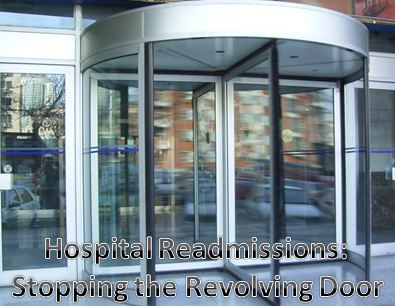The way Medicare pays hospitals changed starting on October 1, 2012. As part of the Affordable Care Act (AKA Obamacare), two new programs are getting underway, Value Based Purchasing and Readmissions Reduction. These programs aim to reward high-performing hospitals for quality care measures, while penalizing on high readmissions rates.
Here are just a few of the statistics that have been reported in a New England Journal of Medicine Study (2009) about hospital readmissions:
One in five elderly patients is readmitted to the hospital 30 days after leaving (approximately 2.3 million rehospitalizations/year).
Those rehospitalizations equal more than $17 billion in annual Medicare costs.
The lead author of that study estimated about 40% of these readmissions were “avoidable” and the Medicare Payment Advisory Board previously stated about 3/4 of all readmissions were potentially preventable.

Here are some examples of what successful hospitals have implemented in geriatric case management and discharge planning improvements to reduce readmissions:
- Identifying high-risk patients for readmissions and helping to ensure follow up care (examples include setting up a follow-up appointment with the physician and doing a follow-up case management call to remind the patient of key items)
- Providing discharge tools such as simple instruction sheets and education or patient counseling
- Improving medication reconciliation
- Improving communications among medical providers
As these changes evolve, we will be bringing you more articles on hospitalization and the elderly as well as continuing to share many of our patient advocacy “insider tips” through our blog posts and newsletter. You can always sign up to get our newest blog posts via email by just entering your email at the top of this page.
As an informed consumer, you may want to check out your local hospitals’ quality scores online. Medicare offers a Hospital Compare tool (as well as other tools for home health and nursing homes), which is a good place to start. There are a lot of different factors that go in to quality care and readmissions rates, however, so scores are just one guideline. The best care for a specific condition may be at one hospital that does not provide the best care in another area. Most importantly, families can be aware of these issues and vigilant in communicating and asking questions. If you are a long-distance caregiver, the value of an onsite care manager is especially high as you try to navigate the system from a distance and set up necessary after-care.
As patient advocates, we applaud the efforts to reduce readmissions, though we understand that this is a complex problem with multiple causes and parties involved. The hospitals can do things to improve, patients and families must take an active role, and after-care providers also play a vital role in continuity of care.
We know hospitalizations bring a lot of stress and sometimes you need someone to talk to about what is going on and what you can do. It may be time to bring in one of our Aging Wisely patient advocates to ensure comprehensive geriatric case management for all of your loved one’s needs, or simply to get some advice to get past the crisis.
Sue Talbott, our Senior Care Consultant, has over 20 years of experience working in local hospitals, rehabilitation centers and skilled nursing. Sue can answer your questions and get you set up with our geriatric care management/patient advocacy or EasyLiving home health services to help in a transition. She is here to help today–at 727-447-5845!
 Popular Downloads
Popular Downloads


 Get Our Newsletter!
Get Our Newsletter! Mission Statement
Mission Statement

